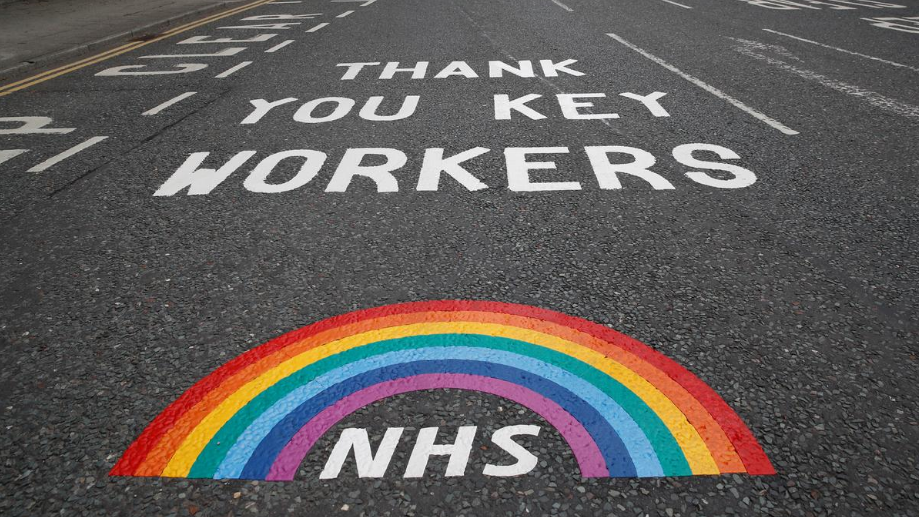00:43

The head of the European Union (EU) agency for disease control said on Monday that Britain was one of the five European countries yet to see a downward trend in their coronavirus outbreak, contradicting the British government's line.
As of May 4, the UK had recorded nearly 190,000 coronavirus cases and almost 28,500 deaths. Only Italy in Europe has so far counted more deaths from COVID-19.
Prime Minister Boris Johnson, who returned to work last week after being seriously ill from COVID-19, said on Thursday the country had passed the peak and was "on the downward slope."

A tribute to the NHS and Key workers is seen on a road following the outbreak of COVID-19 in Manchester /Reuters
A tribute to the NHS and Key workers is seen on a road following the outbreak of COVID-19 in Manchester /Reuters
Andrea Ammon, director of the European Center for Disease Prevention and Control (ECDC), told EU lawmakers that Bulgaria was still recording an increase in cases, while for Britain, Poland, Romania and Sweden the agency had seen "no substantial changes in the last 14 days."
For all other European countries, there was a drop in cases, she said. "As of Saturday, it appears that the initial wave of transmission (in Europe) has passed its peak," Ammon told lawmakers in a video conference.
The ECDC monitors all 27 EU member countries plus Britain, Norway, Liechtenstein and Island.
The ECDC's assessment on Britain is in line with data on the overall increase of deaths from all causes reported by EuroMOMO, an EU-backed monitoring project on mortality.
Epidemiologists said these statistics help to build a more complete picture of the overall impact of epidemics, given many fatalities go unreported or misreported when their number surges exponentially in short periods.
Johnson readies plan to ease lockdown
The public are currently being told to stay at home unless they need to work, buy essentials or take daily exercise, but they must stay at least two meters away from other people.
Maintaining this social distancing while restarting the economy brings huge problems.

UK Prime Minister Boris Johnson displays his "Get Well Soon" cards sent in by children while he was ill with COVID-19 at his office in 10 Downing Street, London, UK, April 28, 2020. /AFP
UK Prime Minister Boris Johnson displays his "Get Well Soon" cards sent in by children while he was ill with COVID-19 at his office in 10 Downing Street, London, UK, April 28, 2020. /AFP
Johnson, according to media reports, will set out his plan to ease a nationwide coronavirus lockdown on May 10, as new guidance emerged on how to maintain social distancing in workplaces.
New guidance drawn up with company bosses and trade unions, seen by BBC and the Financial Times, suggests office workers will be encouraged to stay at home for months to avoid overwhelming the transport system.
Read more:
How the UK government wasted a 48-day window to combat COVID-19
But where staff must come in, companies are being urged to stagger shifts, stop people sharing desks or stationery, step up hygiene measures, keep staff canteens shut and restrict the number of people in lifts.
Shop or bank branch workers dealing with customers must be protected by plastic screens, according to the recommendations – although there are no details on what kind of protective equipment other employees might require.
"It won't work in aviation or any other form of public transport, and the problem is not the plane, it is the lack of space in the airport," said the chief executive of London's Heathrow airport, John Holland-Kaye.
"Just one jumbo jet would require a queue a kilometre long," he wrote in the Daily Telegraph.
(With input from agencies)